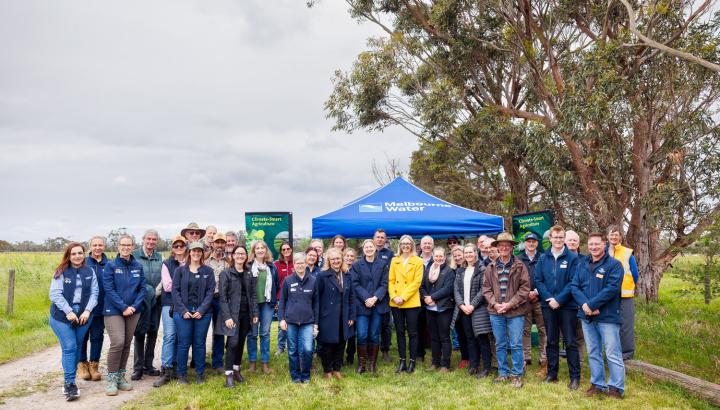
Empowering farmers as leaders in Climate-Smart Agriculture
Melbourne Water is partnering with the agricultural industry, farmers, Landcare and local government to deliver on-farm trials, workshops, and peer learning that boost farm productivity, protect soil and improve biodiversity.
The Climate-Smart Agriculture project, delivered by Melbourne Water on behalf of the Commonwealth’s Regional Delivery Partners program, was officially launched at the Meat Me At The Gate – Paddock to Plate property in Officer South. This initiative is made possible with funding from the Australian Government’s Natural Heritage Trust.
The project will support more than 500 farmers across the Port Phillip and Western Port region. These farmers will adopt on-farm practices that not only increase resilience, improve soil health and protect biodiversity, but also pave the way for a sustainable future.
Trials on participating farms will test a range of agroecological practices, from biological fertilisers and multi-species cover crops to Natural Sequence Farming and EcoVineyard approaches, alongside targeted plantings to attract beneficial invertebrates. Each trial site will include monitoring and on-farm measurements so farmers can see the direct co-benefits of these practices for soil health, pasture productivity, biodiversity, and water quality.
The Hon Julie Collins MP, Minister for Agriculture, Fisheries and Forestry, said climate-smart farming strengthens Australia’s agricultural future and helps farmers manage changing conditions while caring for the landscape.
“The Climate-Smart Agriculture program is a clear example of how we can support farmers to be leaders in climate-smart and sustainable agriculture, while also strengthening Australia’s agricultural future.”

Melbourne Water Managing Director, Dr Nerina Di Lorenzo, said that supporting farmers to adopt climate-smart practices is an investment in supporting the region’s food bowl.
“Healthy farms mean healthy catchments and resilient communities. By running locally-led trials, sharing decision-support tools and scaling what works, we’re helping farmers protect vital soils, cut erosion and nutrient loss, and reduce runoff into our rivers and bays. Outcomes that safeguard both farm incomes, food security and water quality for everyone.”
Local farmers, Simon and Michelle Beard, who are hosting one of the program’s trial sites, said the program lets farmers test practical approaches on their own farms, share results with neighbours, and build confidence in managing climate risks.
“We’re proud to be able to supply quality, locally-raised beef as a direct paddock to plate business for the Melbourne region, and this project ensures that we are adopting agroecological practices to protect natural assets through the whole process.”
This project is supported by the Australian Government through funding from the Natural Heritage Trust under the Climate-Smart Agriculture Program.
Media contact:



